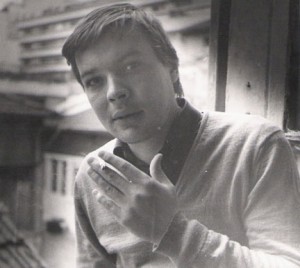George Santayana was friends with Joe Trumbull Stickney. In 1952, five decades after Stickney died from a brain tumour, Santayana wrote a letter about their friendship to William Kirkwood. The letter is reproduced in facsimile in M. Kirkwood’s life of Santayana (1961, pp. 234-235).
Via di Santo Stefano Rotundo, 6
Rome, May 27, 1952
To Professor Wm. A. Kirkwood, Ph. D.
Trinity College, Toronto
Dear Sir,
It was a happy impulse that prompted you to think that the books you speak of and their annotations, and especially the lines in praise of Homer written by my friend Stickney would interest me. They have called up vividly in my mind the quality of his mind, although the verses represent a much earlier feeling for the classics, and a more conventional mood than he had in the years when we had our frequent moral fencing bouts; for there was a contrary drift in our views in spite of great sympathy in our tastes and pursuits. These verses are signed Sept. 15/ 90. Now Stickney graduated at Harvard in 1895, so that five years earlier he must have been about 17 years old. This explains to me the tone of the verses and also the fact that they advance line by line, seldom or never running over and breaking the next line at the cesura or before it, as he would surely have done in his maturity, when he doted on the dramatic interruptions of Shakespeare’s lines in Antony and Cleopatra in particular, and in all the later plays in general. [page break]
I see clearly the greater mastery and strength of impassioned drama, if impassioned drama is what you are in sympathy with; but I like to warn dogmatic critics of what a more naive art achieves in its impartial and peaceful labour and the risk that overcharged movement or surpluses [?] runs of drowning in its deathbed [?] waters. Every form of art has its charm and is appropriate in its place; but it is moral cramp to admit only one form of art to be legitimate or important. The reminder of this old debate that I had with Stickney who enlightened me more (precisely about the abuse of rhetoric) than I ever could enlighten him about the relativity of everything has been a pleasant reminder of younger days: although I am not sure that much progress towards reason and justice has been made since by critical opinion.
With best thanks and regards
Yours sincerely
G. Santayana
Reference:
M. M. Kirkwood [1961]: Santayana: Saint of the Imagination. Toronto, Canada: University of Toronto Press.
Previous posts on George Santayana here, and Joe Stickney here.

